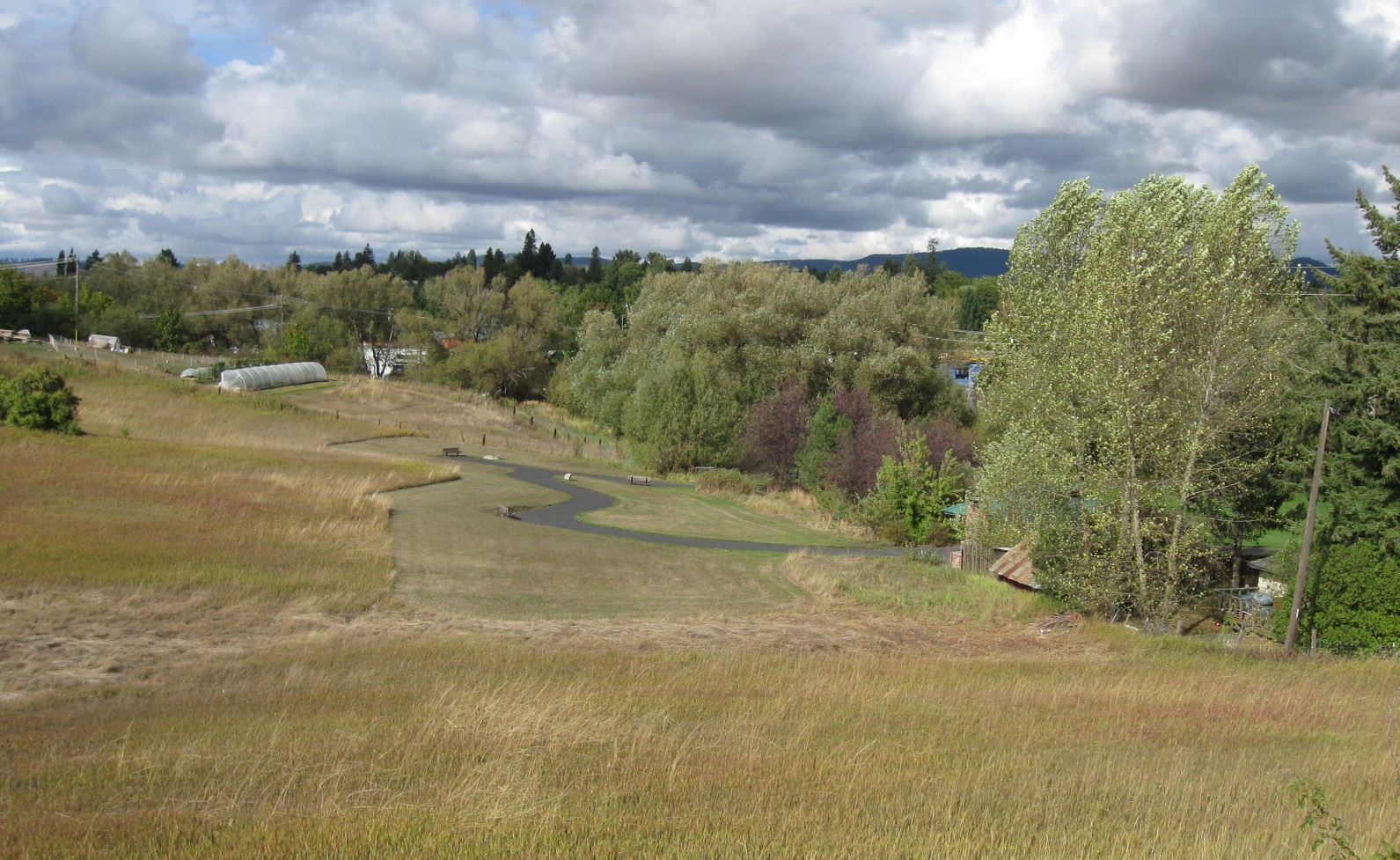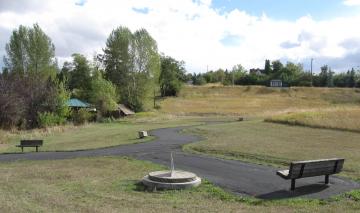Berman Creekside Park
Along Styner Avenue lies a small city park that borders Paradise Creek and offers a peaceful respite for community members. Berman Creekside Park was created in 1997, after long discussions and negotiations with two landowners, the city of Moscow Parks and Recreation Department and the Palouse Land Trust. Creating a park in this hard to access location had been discussed for a long time by the committee planning the Linear Park System that today encompasses miles of trail and open space along Paradise Creek. The namesake of the park, Katrina Berman, was instrumental in getting this park created.
In 1996, Katrina Berman approached the Palouse Land Trust to inquire about preserving the land her family had lived on since the 1950s as a park for the city of Moscow. She stated that she wanted to "preserve the unique character of this part of Moscow and leave a legacy from my late husband, myself, and our family, that all of Moscow can appreciate and enjoy.”
Katrina had heard that her neighbor, Dave Plummer, was selling his property and that the city was looking into a possible purchase of the land. She decided to make an offer to the city. If they would purchase the Plummer acres and commit to it becoming a park she would donate her piece of land to the park to increase its size and ensure continual trail access.
In September 1997, after long legal discussions and visioning for the land, an agreement was struck. The City of Moscow purchased the Plummer property. Before Katrina donated her piece of land to the City, she wanted to make sure it would remain as natural open space, so she worked with the Land Trust to place a conservation easement on the land before donating it to the City.
In the years of living on the land she witnessed a great variety of wildlife species. Today you can see many species of birds and small mammals like raccoons, gophers, voles, beavers, and skunks. There is evidence that deer have used the property as well. They often travel through the park and feed amongst the old fruit trees that remain on property that the Berman family still owns.
Today the park is managed by the City of Moscow Parks and Recreation Department. The Land Trust monitors the portion under easement to ensure that it is being maintained in a natural state. Make sure to visit this park and see one of our gems. There is a pavilion that can be reserved for parties, a portion of the Paradise Creek Trail to walk, a sledding hill to enjoy in winter, and beautiful views.
2022: With permission from Katrina’s son and close family friend Suvia Judd, we are honored to share Katrina’s previously unpublished obituary. We are forever grateful for Katrina’s vision for the land and the community and are glad to celebrate her memory here.
Katrina Berman, 1919-2012
Katrina Voorhees Berman died peacefully on September 12,
2012 with family members at her side.
She was born in Philadelphia on November 25, 1919 to Elsa
and James Voorhees. Until age three, she lived in Paris,
where her father served as a diplomat with the U.S.
delegation to the League of Nations.
After her father s foreign service ended, she lived in
Princeton, New Jersey. Katrina moved to New York City in
her teen years, and enjoyed spending summers at a family
retreat in Sugar Hill, New Hampshire. As a foreign
exchange student in Germany, she recalled shaking hands
with Adolf Hitler at a Nazi youth camp she attended with
her host family s children.
While attending Bennington College, Katrina interned as a
social worker with the Tennessee Valley Authority, serving
families in the mountains of Southern Appalachia
devastated by the Great Depression. That experience led
her to study economics, and affirm a lifetime commitment
to public service. In her youth, she was also active in
the pacifist and civil rights movements of the day. Upon
graduation from Bennington in 1942, sh,e went to work as
an economist in the Antitrust Division of the U.S.
Department of Justice, where she met her future husband,
Herbert Berman, who worked there as prosecutor. After she
married Herbert in 1945, the couple settled in New York
City, before moving to Moscow, Idaho in 1952, where
Katrina lived the remainder of her life.
After her children started school, Katrina decided to
renew her studies in economics, obtaining a masters
degree from Columbia University, and a Ph.D. from
Washington State University in 1966. She subsequently
taught economics at Washington State University and the
University of Idaho. She was widely known as an expert on
employee-managed enterprises, and served as a financial
adviser to a number of worker cooperatives in the Pacific
Northwest and around the world.
After retirement from teaching, she renewed her public
service with the League of Women Voters of Idaho. She
became a familiar figure around the state capitol in
Boise, lobbying for the League on natural resource issues.
Katrina loved music, a passion she transmitted to her
children. She was an accomplished pianist, and
participated for many years in local singing groups, even
taking voice lessons in her seventies. She was an avid
reader, loved being outdoors. Most of all, she enjoyed
spending time with her family.
Katrina is survived by sons Jonathan and Matthew,
daughters Deborah and Judith, five grandchildren, a large
extended family, and friend and caregiver Suvia Judd. She
was preceded in death by her husband, Herbert, sister Elsa
Hauschka, and brother James Voorhees. Her family is
planning a memorial service to be announced later.




